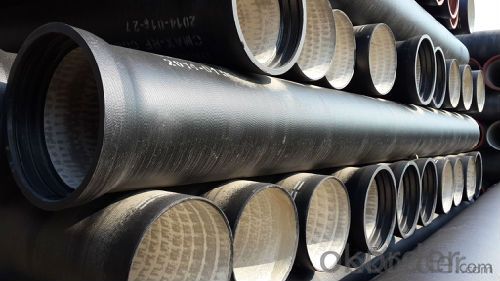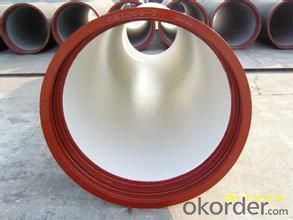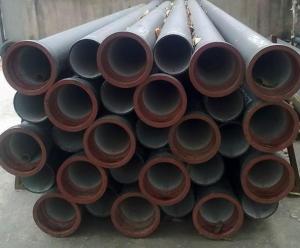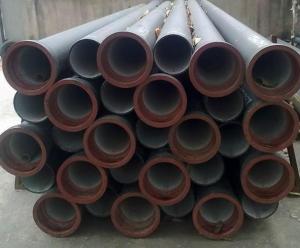Ductile Iron Pipe of China Comply with EN545
- Loading Port:
- China main port
- Payment Terms:
- TT or LC
- Min Order Qty:
- 1000 m
- Supply Capability:
- 100000 m/month
OKorder Service Pledge
OKorder Financial Service
You Might Also Like
1. Ductile Iron Pipe Description :
It has high strength & hardnes as steel and better corrosin resistance than steerl and grey iron, I ductile iron pipe is the ideal substute for gray cast iron pipe and common steel pipe. In addition, our DI pipes are produced with good straightness, identical wall thickness, high dimension accuracy, smooth surface finished, remarkable mechanical properties and firmly sticking internal & external coating layer as well.
2. Ductile Iron Pipe Main Features:
1. ISO 2531 or EN 545 Standard K9 Class, K7 Class and C Class
2. ISO 9001 Certificate
3. ISO 2531 & EN 545 Certificate
4. WRAS Potable Water Certificate for Cemen Internal Lining
5. WRAS EPDM Rubber Gasket or NBR Rubber Gasket
6. DN80mm - DN2600mm
3.Ductile Iron Pipe Images:


4.Ductile Iron Pipe Specification:
1.Standard:ISO2531,EN545,EN598
2.Effective Length:6m/5.7m
3.Internal Lining :Cement mortar, Cement mortar Plus Epoxy
4.External coating:Zinc Primer Plus Bitumen or PE
5. Shipment: By bulk ship or 20'/40' container
6. Rubber: NBR, SBR, EPDM according to ISO4633/EN681.1
7.Quick Delivery
5.FAQ:
· Management Systems-Internal Software
· Finished Product Inventory-More Than 5000 Tons.
· Raw Material inventory -Over 8000 Mertic Tons.
· The most convenient transport and prompt delivery.
· Competitive price with best service .
· High technical production line with top quality products.
· High reputation based on best quality products.
- Q:Will nodular cast iron pipes rust?
- Ductile iron pipe corrosion process is good, decided whether it will rust. Whether it will rust or not, the key is whether the anti-corrosion process of the nodular cast iron pipe is in place.
- Q:How are ductile iron pipes protected against external impact or loading?
- Ductile iron pipes are protected against external impact or loading through various methods. One common method is to apply a protective coating or wrapping on the pipes, which helps to prevent corrosion and reduces the risk of damage from external forces. Additionally, the pipes are often designed with a thicker wall thickness to enhance their strength and resistance to external impact. Furthermore, the installation of appropriate bedding and backfill materials around the pipes provides additional support and protection against external loading. Regular inspections and maintenance practices also play a crucial role in ensuring the long-term durability and protection of ductile iron pipes.
- Q:How does ductile iron pipe perform in areas with high soil compaction?
- Ductile iron pipe performs well in areas with high soil compaction due to its strong and durable characteristics. Its flexible nature allows it to withstand the pressure exerted by compacted soil, preventing deformation or damage. Additionally, the material's high tensile strength and resistance to cracking make it an ideal choice for areas where soil compaction is a concern.
- Q:Can ductile iron pipes be used in contaminated soil conditions?
- Yes, ductile iron pipes can be used in contaminated soil conditions. Ductile iron is known for its strength, durability, and corrosion resistance, making it suitable for various soil conditions, including those contaminated with chemicals or other pollutants. The material's resistance to corrosion ensures that the pipes can withstand the harsh conditions and maintain their structural integrity over time. However, it is important to consider the type and level of contamination in the soil and consult with experts to determine if any additional protective measures or coatings are required to ensure the long-term performance of the pipes.
- Q:Can ductile iron pipes be used for conveying gases?
- Yes, ductile iron pipes can be used for conveying gases. Ductile iron has excellent mechanical properties and is resistant to corrosion, making it a suitable material for transporting various types of gases. Additionally, ductile iron pipes are known for their strength and durability, making them a reliable choice for gas transmission systems.
- Q:Are there any special coatings or linings available for ductile iron pipe?
- Indeed, there are specialized coatings and linings that can be utilized for ductile iron pipe. These coatings and linings are employed on either the internal or external surfaces of the pipe in order to safeguard against corrosion and prolong the pipe's lifespan. Cement mortar lining, polyethylene encasement, epoxy coating, and polyurethane lining are among the common coatings and linings utilized for ductile iron pipe. These coatings and linings are specifically designed to prevent corrosion when the pipe comes into contact with different substances such as water, chemicals, and soil. The choice of which coating or lining to use is dependent on the specific application and the environment in which the pipe will be installed.
- Q:How is ductile iron pipe different from other types of pipes?
- Ductile iron pipe differs from other pipe types in several ways. To begin with, its exceptional strength and durability are well-known. It is composed of a unique combination of iron, carbon, and other alloying elements, giving it superior mechanical properties compared to other pipes. Consequently, ductile iron pipe is highly resistant to external forces and pressure, making it ideal for underground installations, water mains, and sewer systems. Moreover, ductile iron pipe exhibits excellent corrosion resistance. Typically, it is lined with cement mortar or an internal coating, which acts as a protective barrier against corrosion and lengthens the pipe's lifespan. This makes ductile iron pipe particularly suitable for transporting water and other fluids, as it prevents contamination and maintains the material's quality. Additionally, ductile iron pipe offers a high level of flexibility. Unlike more rigid pipe materials such as cast iron, ductile iron pipe can withstand moderate deflection and ground movement without fracturing or breaking. This flexibility reduces the risk of failure and decreases the need for expensive repairs or replacements. Finally, ductile iron pipe is relatively easy to install and maintain. Usually, it is available in long lengths, minimizing the number of joints required. Furthermore, its mechanical properties and corrosion resistance make it less prone to damage during installation or operation, resulting in lower maintenance costs over time. In conclusion, ductile iron pipe stands apart from other pipes due to its exceptional strength, corrosion resistance, flexibility, and ease of installation. These characteristics make it a reliable and cost-effective choice for various applications, particularly in the water and wastewater industry.
- Q:Can ductile iron pipe be used for hot water applications?
- Yes, ductile iron pipe can be used for hot water applications. It has excellent heat resistance and can withstand high temperatures, making it suitable for conveying hot water in various plumbing systems.
- Q:What are the advantages of using ductile iron pipe?
- There are several advantages of using ductile iron pipe in various applications. Firstly, ductile iron pipe is known for its exceptional strength and durability. It has a higher tensile strength and yield strength than other types of pipes, making it resistant to cracking, bending, and breaking. This strength allows it to withstand high-pressure and heavy-load conditions, making it ideal for applications such as water and sewage systems, oil and gas pipelines, and industrial piping. Secondly, ductile iron pipe has excellent corrosion resistance. It is coated with a protective layer, usually zinc or epoxy, which prevents rusting and corrosion. This coating ensures a longer lifespan for the pipe, even in harsh environments or when transporting corrosive fluids. Another advantage of ductile iron pipe is its flexibility. Unlike rigid pipes, ductile iron pipes have a certain degree of flexibility, allowing them to withstand ground movement and settle without breaking. This flexibility is particularly beneficial in areas prone to earthquakes or soil settlements. Additionally, ductile iron pipe has a smooth inner surface, which helps to minimize flow resistance and improve the efficiency of fluid transportation. It also reduces the likelihood of sediment buildup or corrosion on the pipe's interior, resulting in improved flow rates and reduced maintenance. Furthermore, ductile iron pipe is cost-effective in the long run. Although it may have a higher initial cost compared to other types of pipes, its durability and low maintenance requirements make it a more cost-effective choice over time. The extended lifespan of ductile iron pipe reduces the need for frequent replacements and repairs, resulting in lower overall life-cycle costs. Lastly, ductile iron pipe is environmentally friendly. It is made from recycled materials, and its long lifespan reduces the need for frequent replacements, thus reducing the carbon footprint associated with manufacturing and transportation. In conclusion, the advantages of using ductile iron pipe include its exceptional strength, corrosion resistance, flexibility, smooth inner surface, cost-effectiveness, and environmental friendliness. These qualities make it a reliable and preferred choice for a wide range of applications in various industries.
- Q:How are ductile iron pipes tested for quality assurance?
- To guarantee the quality and adherence to industry standards of ductile iron pipes, a variety of testing procedures are carried out. These tests evaluate both the raw materials and the finished products, aiming to ensure the pipes' durability, strength, and overall reliability. The first step involves analyzing the chemical composition of the raw materials used in the manufacturing process. This analysis verifies that the iron, carbon, and other elements fall within the specified range, as different compositions can impact the pipes' strength and resistance to corrosion. Next, mechanical tests assess the pipes' strength and ductility. Tensile tests determine properties like ultimate tensile strength, yield strength, and elongation, which help assess the pipes' ability to withstand external pressure and bending forces. Moreover, impact tests measure the pipe's ability to resist sudden loading or impact. By evaluating the energy absorbed by the pipes under high impact force, these tests ensure that the pipes can endure accidental impacts during installation or operation. Another pivotal test is the hydrostatic pressure test, which examines the pipes' capacity to withstand internal pressure. By subjecting the pipes to a specific pressure for a designated duration while filled with water, this test ensures their capability to handle expected operating pressures without any leakage or failure. Furthermore, dimensional and visual inspections are conducted to verify that the pipes meet the required specifications. These inspections involve checking the outer diameter, length, wall thickness, and overall appearance for any defects, such as cracks, voids, or irregularities. Lastly, corrosion resistance tests evaluate the pipes' ability to resist corrosion when exposed to different environments or fluids. These tests help determine the pipes' expected lifespan and their suitability for various applications. In conclusion, these quality assurance tests are vital in ensuring that ductile iron pipes adhere to the necessary standards and deliver dependable, long-lasting performance in diverse infrastructure projects.
1. Manufacturer Overview |
|
|---|---|
| Location | |
| Year Established | |
| Annual Output Value | |
| Main Markets | |
| Company Certifications | |
2. Manufacturer Certificates |
|
|---|---|
| a) Certification Name | |
| Range | |
| Reference | |
| Validity Period | |
3. Manufacturer Capability |
|
|---|---|
| a)Trade Capacity | |
| Nearest Port | |
| Export Percentage | |
| No.of Employees in Trade Department | |
| Language Spoken: | |
| b)Factory Information | |
| Factory Size: | |
| No. of Production Lines | |
| Contract Manufacturing | |
| Product Price Range | |
Send your message to us
Ductile Iron Pipe of China Comply with EN545
- Loading Port:
- China main port
- Payment Terms:
- TT or LC
- Min Order Qty:
- 1000 m
- Supply Capability:
- 100000 m/month
OKorder Service Pledge
OKorder Financial Service
Similar products
New products
Hot products
Related keywords




























